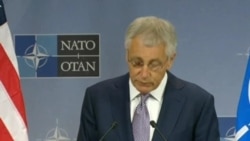BRUSSELS —
US Defense Secretary Chuck Hagel has completed a round-the-world trip aimed at reassuring partners, boosting cyber security, and charting a way forward in Afghanistan after next year's drawdown of foreign troops. Hagel's last stop was in Brussels.
For Hagel, his round-the-world trip was largely about reassuring allies, first in Asia and later at a NATO defense ministers' meeting in Europe, that Washington's budget problems are not eroding U.S. commitments.
"I assured my fellow ministers that the United States is not considering any reductions that will affect NATO's ability to fulfill its core tasks of collective defense, crisis management, and cooperative security. Our commitment to NATO remains iron clad," Hagel said.
For the first time, there was a session on cyber security.
"We have already made important progress in protecting the NATO networks. We must identify what more we need to do to identify cyber threats, which are evolving as we speak," said Anders Fogh Rasmussen, NATO Secretary-General.
Discussions on the way forward in Afghanistan were high on the agenda in Brussels. Most of the US and other international troops are due to pull out by the end of next year.
It's been an especially bloody fighting season with Afghan national forces losing more than 100 troops a week for the past two weeks.
And that is delaying a decision on how many international troops should stay beyond 2014 to train, advise, and assist Afghan forces.
Absent from the formal agenda were discussions of any potential involvement in Syria despite claims by France that it has confirmed the use of sarin gas in the conflict, including at least once by the Assad regime.
Hagel said he hasn't seen intelligence supporting the French accounts. He said NATO is not considering action on Syria.
"Our focus is on protecting our members and what we are doing to assure the defenses of Turkey and to assist our NATO member Turkey, but, beyond that, we didn't get into any additional war plans regarding Syria," Hagel said.
As NATO looks to wind down operations in Afghanistan and stay out of the Syrian conflict, the alliance is boosting its involvement in Libya. It has agreed to send a team of experts - but not troops - to help train the Libyan government in efforts to secure its borders and stem the flow of militants entering from Mali.
For Hagel, his round-the-world trip was largely about reassuring allies, first in Asia and later at a NATO defense ministers' meeting in Europe, that Washington's budget problems are not eroding U.S. commitments.
"I assured my fellow ministers that the United States is not considering any reductions that will affect NATO's ability to fulfill its core tasks of collective defense, crisis management, and cooperative security. Our commitment to NATO remains iron clad," Hagel said.
For the first time, there was a session on cyber security.
"We have already made important progress in protecting the NATO networks. We must identify what more we need to do to identify cyber threats, which are evolving as we speak," said Anders Fogh Rasmussen, NATO Secretary-General.
Discussions on the way forward in Afghanistan were high on the agenda in Brussels. Most of the US and other international troops are due to pull out by the end of next year.
It's been an especially bloody fighting season with Afghan national forces losing more than 100 troops a week for the past two weeks.
And that is delaying a decision on how many international troops should stay beyond 2014 to train, advise, and assist Afghan forces.
Absent from the formal agenda were discussions of any potential involvement in Syria despite claims by France that it has confirmed the use of sarin gas in the conflict, including at least once by the Assad regime.
Hagel said he hasn't seen intelligence supporting the French accounts. He said NATO is not considering action on Syria.
"Our focus is on protecting our members and what we are doing to assure the defenses of Turkey and to assist our NATO member Turkey, but, beyond that, we didn't get into any additional war plans regarding Syria," Hagel said.
As NATO looks to wind down operations in Afghanistan and stay out of the Syrian conflict, the alliance is boosting its involvement in Libya. It has agreed to send a team of experts - but not troops - to help train the Libyan government in efforts to secure its borders and stem the flow of militants entering from Mali.





